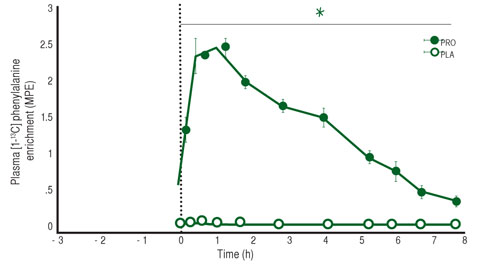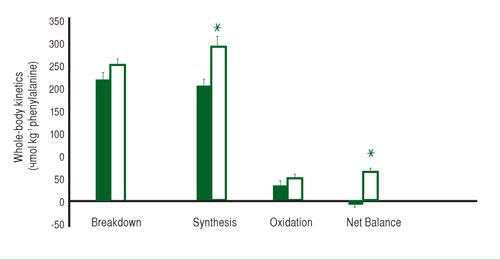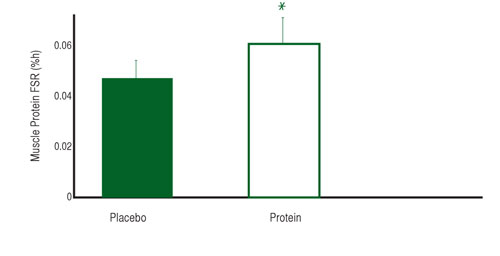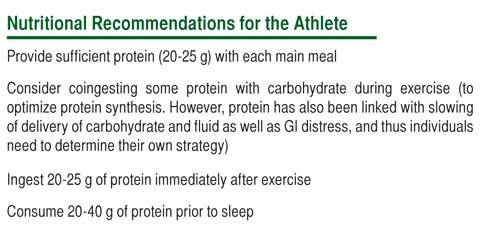Luc J.C. van Loon
KEY POINTS
- Dietary protein ingestion immediately after exercise increases muscle protein synthesis rates during the acute stages of post-exercise recovery.
- Muscle protein synthesis rates are low during overnight sleep even when dietary protein is ingested after exercise.
- If dietary protein is made available to the intestine during sleep, protein is normally digested and absorbed thereby increasing plasma amino acid availability and increasing muscle protein synthesis rates.
- Dietary protein ingested prior to sleep is effectively digested and absorbed during the night, thereby increasing plasma amino acid availability and stimulating post-exercise muscle protein accretion during overnight sleep.
- Ingestion of dietary protein prior to sleep may represent an effective dietary strategy to facilitate the skeletal muscle adaptive response to exercise training and to further improve exercise training efficiency.
INTRODUCTION
Dietary protein plays a key role in facilitating the skeletal muscle adaptive response to exercise training. A single bout of exercise stimulates muscle protein synthesis and, to a lesser extent, muscle protein breakdown. However, post-exercise protein balance will remain negative in the absence of food intake (Phillips et al., 1997). Dietary protein ingestion stimulates skeletal muscle protein synthesis, inhibits protein breakdown, and therefore, stimulates muscle protein accretion following both resistance (Koopman et al., 2005, 2007; Tipton et al., 1999, 2001) and endurance (Howarth et al., 2009; Levenhagen et al., 2001) exercise. This leads to a greater skeletal muscle adaptive response to each successive exercise bout and may result in more efficient skeletal muscle reconditioning. Consequently, dietary strategies are being designed to maximize the post-exercise muscle protein synthetic response. At present, several research groups are attempting to define the preferred amount and source of dietary protein that should be ingested and the preferred timing of dietary protein consumption to maximize post-exercise muscle protein synthesis rates and optimize muscle reconditioning.
There is not much information on the preferred amount of dietary protein that should be ingested to maximize post-exercise muscle protein synthesis rates. A single dose-response study assessed the post-exercise muscle protein synthetic response to different dosages of egg protein, showing that muscle protein synthesis rates increase with the ingestion of greater amounts of protein and reach maximal stimulation after ingesting 20 g of protein (Moore et al., 2009). However, it should be noted that this dose response relationship likely differs between young and older populations (Pennings et al., 2012; Yang et al., 2012). Various studies have reported improvements in post-exercise protein balance and/or greater muscle protein synthesis rates following the ingestion of different protein sources, including whey and casein protein (Tipton et al., 2004), soy protein (Wilkinson et al., 2007), casein protein hydrolysate (Koopman et al., 2005, 2006), egg protein (Moore et al., 2009) and whole-milk and/ or fat-free milk (Elliot et al., 2006; Wilkinson et al., 2007). To date, few studies have directly compared the post-exercise muscle protein synthetic responses to the ingestion of different protein sources. Milk protein and its main isolated constituents, whey and casein, offer an anabolic (muscle building) advantage over soy protein (Tang et al., 2009; Wilkinson et al., 2007). Furthermore, whey protein seems to induce a greater muscle protein synthetic response when compared with casein (Tang et al., 2009). The differences in the muscle protein synthetic response to the ingestion of various protein sources can be attributed to differences in protein digestion and absorption kinetics (Koopman et al., 2009; Tipton et al., 2004) as well as amino acid composition (Pennings et al., 2011; Tang et al., 2009), with leucine content being of particular interest.
RESEARCH REVIEW
Timing of Protein Intake
Besides the amount and source of protein ingested during acute post-exercise recovery, the timing of protein ingestion has been identified as a key factor modulating post-exercise muscle protein anabolism (Beelen et al., 2011a). A more direct provision of dietary protein following the cessation of exercise has been shown to result in a more positive protein balance, when compared to protein provided several hours after exercise (Levenhagen et al., 2001). Furthermore, recent studies suggest that carbohydrate (CHO) and protein co-ingestion prior to and/or during exercise may further augment post-exercise muscle protein accretion (Beelen et al., 2008a, 2011b; Tipton et al., 2001). The latter was attributed to the more rapid supply of amino acids to the muscle during the acute stages of post-exercise recovery.
However, protein ingestion prior to and/or during exercise can also stimulate muscle protein synthesis during exercise, thereby creating an extended time frame for muscle protein synthesis to be elevated (Beelen et al., 2008a, 2011b; Koopman et al., 2004).
The impact of protein ingestion prior to, during and/or immediately after exercise on subsequent muscle protein synthesis rates has been the subject of investigation. In general, most of these studies assess the effects of dietary protein intake on the muscle protein synthetic response to exercise performed in an overnight fasted state. Under these conditions, it seems reasonable to assume that the limited endogenous availability of amino acids from the gut and the intramuscular free amino acid pool may prevent a substantial rise in post-exercise muscle protein synthesis rate. As such, it is not surprising that studies consistently report that dietary protein provision increases post-exercise muscle protein synthesis rates. However, in normal everyday practice, sports activities are generally performed 1-3 h after consuming a snack or meal, with many recreational athletes performing exercise in the evening.
Recently, we evaluated the effect of exercise performed in the evening and the efficacy of dietary protein ingestion during and immediately after exercise on muscle protein synthesis during subsequent overnight recovery (Beelen et al., 2008b). We observed an increase in protein synthesis during the acute stages of post-exercise recovery when ample protein was ingested. However, muscle protein synthesis rates during subsequent overnight sleep were unexpectedly low, with values even lower than generally observed in the morning following an overnight fast. Clearly, ingesting only 20-25 g of dietary protein during and/or immediately after the cessation of exercise does not suffice to maximize overnight muscle reconditioning.
Muscle Protein Synthesis During Overnight Sleep
Most recreational athletes perform exercise in the evening and ingest 20-25 g of a high-quality protein during or after exercise to maximize muscle protein accretion during the acute stages of postexercise recovery. As detailed above, this strategy does not allow a sustained increase in muscle protein synthesis rates during subsequent overnight recovery (Beelen et al., 2008b). We questionedif the reported low muscle protein synthesis rates during overnight sleep could be simply attributed to the limited plasma amino acid availability throughout the night. Consequently, we questioned whether protein provision during sleep would represent a feasible dietary strategy to increase overnight plasma amino acid availability. It has been reported that human intestinal motility follows a circadian rhythm with reduced nocturnal activity (Furukawa et al., 1994; Kumar et al., 1990), so we first assessed whether dietary protein provision during sleep leads to proper dietary protein digestion and absorption. To obtain proof of principle, we first administered dietary protein via a nasogastric tube during sleep and assessed subsequent in vivo dietary protein digestion and absorption kinetics by combining the use of specifically produced [1-13C]phenylalanine labeled casein protein with continuous intravenous infusion of [ring-2H5]phenylalanine (Groen et al., 2011). The use of both an oral and intravenous tracers allows us to assess dietary protein digestion and absorption kinetics, as well as, its subsequent use for muscle protein synthesis. The dietary protein administered during sleep was properly digested and absorbed, resulting in a rapid appearance rate of dietary protein derived amino acids in the circulation. Furthermore, this overnight increase in plasma amino acid availability increased muscle protein synthesis rates and improved whole-body protein balance during overnight sleep. An interesting finding revealed that a substantial amount of the [1-13C]phenylalanine derived from the ingested protein was clearly used for the de novo or new muscle protein synthesis, as evidenced by the fact that skeletal muscle biopsy samples collected in the morning showed much of the muscle protein to be enriched with [1-13C]phenylalanine (Groen et al., 2011). We concluded that dietary strategies that allow dietary protein provision during overnight sleep allow muscle protein synthesis rates to be increased during overnight recovery, thereby increasing the window of opportunity to modulate muscle protein metabolism. Such overnight feeding strategies provide a thought-provoking concept upon which novel interventional strategies can be developed to more effectively support muscle mass maintenance and/or accretion in both health and disease.

Figure 1. Plasma [1-13C]phenylalanine enrichments following ingestion of intrinsically [1-13C]phenylalanine labeled protein (PRO) or placebo(PLA) prior to sleep. Values are expressed as means + SEM. Data were analyzed with repeated-measures ANOVA (treatment x time). Plasma [1-13C]phenylalanine enrichments: treatment effect, P<0.01; time effect, P<0.01; interaction of treatment and time, P<0.01. *Significantly different from PLA (P<0.05). Figure redrawn from Res et al. (2012) Med. Sci. Sports Exerc. 44:1560-1569, American College of Sports Medicine.
Protein Ingestion Prior to Sleep
The conclusion that nocturnal dietary protein administration may stimulate overnight muscle protein accretion provides many intriguing opportunities.
For example, the application of nocturnal protein provision in sports practice may optimize post-exercise recovery during overnight sleep. To address this issue, we selected a group of recreational athletes who performed a single bout of resistance type exercise in the evening (20:00 h) after a full day of dietary standardization (Res et al., 2012). All athletes were provided with appropriate recovery nutrition (20 g protein plus 60 g CHO) immediately after cessation exercise (21:00 h). Thereafter, 30 min prior to sleep (23:30 h), subjects ingested either a beverage with or without 40 g of specially produced intrinsically [1-13C]phenylalanine casein protein. Using contemporary stable isotope methodology combined with the use of intrinsically labeled protein, we were able to assess both dietary protein digestion and absorption kinetics as well as whole-body and muscle protein synthesis rates during overnight sleep.
After ingestion of the protein, we observed a rapid increase in [1-13C]phenylalanine enrichment in the blood, providing evidence that the ingested protein was being properly digested and absorbed, resulting in a continued provision of dietary protein derived amino acids into the circulation (Figure 1). The greater overnight amino acid availability increased post-exercise muscle protein synthesis rates, thereby improving overnight whole-body protein balance (Figure 2).

Figure 2. Rates of whole-body protein breakdown and synthesis, protein oxidation rates and net protein balance in the protein (PRO, white bar) and placebo (PLA, black bar) experiments measured during 7.5 h of overnight recovery. Values represent means ± SEM. *Significantly different from PLA (P<0.05). Figure redrawn from Res et al. (2012) Med. Sci. Sports Exerc. 44:1560-1569, American College of Sports Medicine.
As whole-body protein synthesis rates do not necessarily reflect muscle protein, we also collected skeletal muscle biopsies in the evening and after waking up in the morning. The latter also allowed us to assess muscle protein synthesis, showing ~22% higher fractional muscle protein synthesis rates throughout post-exercise overnight sleep (Figure 3). These data show that provision of dietary protein prior to sleep represents an effective nutritional intervention to increase plasma amino acid availability, stimulate post-exercise muscle protein synthesis and improve whole-body protein balance during overnight sleep. The latter may provide an effective supplementation strategy to further augment the skeletal muscle adaptive response to exercise training and, as such, to improve training efficiency.

Figure 3. Dietary protein ingestion prior to sleep stimulates muscle protein synthesis during overnight recovery. Fractional synthesis rate (FSR) of mixed muscle protein during overnight recovery from a single bout of resistance type exercise. In the protein trial, 40 g of casein protein were ingested prior to sleep. Values represent means ± SEM. *Significantly different from placebo (P=0.05). Figure redrawn from Res et al. (2012) Med. Sci. Sports Exerc. 44:1560-1569, American College of Sports Medicine.

Figure 4. Practical recommendations for the athlete regarding dietary protein intake during and after an exercise session to optimize protein synthesis.
SUMMARY
Dietary protein ingestion immediately after exercise increases postexercise muscle protein synthesis rates, thereby facilitating the skeletal muscle adaptive response to prolonged exercise training. However, the post-exercise increase in muscle protein synthesis rate is not maintained during subsequent overnight sleep. Recent work shows that protein ingested prior to sleep is effectively digested and absorbed during the night, thereby increasing plasma amino acid availability and stimulating post-exercise muscle protein accretion during post-exercise overnight sleep. Consequently, dietary protein ingestion prior to sleep may represent an effective dietary strategy to inhibit muscle protein breakdown, stimulate muscle protein synthesis, facilitate the skeletal muscle adaptive response to exercise training and improve exercise training effectiveness.
REFERENCES
Beelen M., R. Koopman, A.P. Gijsen, H. Vandereyt, A.K. Kies, H. Kuipers, W.H. Saris, and L.J. van Loon (2008a). Protein coingestion stimulates muscle protein synthesis during resistance-type exercise. Am. J. Physiol. 295: E70-77.
Beelen M., M. Tieland, A.P. Gijsen, H. Vandereyt, A.K. Kies, H. Kuipers, W.H. Saris, R. Koopman, and L.J. van Loon (2008b). Coingestion of carbohydrate and protein hydrolysate stimulates muscle protein synthesis during exercise in young men, with no further increase during subsequent overnight recovery. J. Nutr. 138: 2198-2204.
Beelen M., L.M. Burke, M.J. Gibala, and L.J. van Loon (2011a). Nutritional strategies to promote postexercise recovery. Int. J. Sport Nutr. Exerc. Metab. 20: 515-532.
Beelen M., A. Zorenc, B. Pennings, J.M. Senden, H. Kuipers, and L.J. van Loon (2011b). Impact of protein coingestion on muscle protein synthesis during continuous endurance type exercise. Am. J. Physiol. 300:E945-954.
Elliot T.A., M.G. Cree, A.P. Sanford, R.R. Wolfe, and K.D. Tipton (2006). Milk ingestion stimulates net muscle protein synthesis following resistance exercise. Med. Sci. Sports Exerc. 38: 667-674.
Furukawa Y., I.J. Cook, V. Panagopoulos, R.D. McEvoy, D.J. Sharp, and M. Simula (1994). Relationship between sleep patterns and human colonic motor patterns. Gastroenterology 107: 1372-1381.
Groen B.B., P.T. Res, B. Pennings, E. Hertle, J.M. Senden, W.H. Saris, and L.J. van Loon (2011). Intragastric protein administration stimulates overnight muscle protein synthesis in elderly men. Am. J. Physiol. 302: E52-60.
Howarth K.R., N.A. Moreau, S.M. Phillips, and M.J. Gibala (2009). Coingestion of protein with carbohydrate during recovery from endurance exercise stimulates skeletal muscle protein synthesis in humans. J. Appl. Physiol. 106: 1394-1402.
Koopman R., D.L. Pannemans, A.E. Jeukendrup, A.P. Gijsen, J.M. Senden, D Halliday, W.H. Saris, L.J. van Loon, and A.J. Wagenmakers (2004). Combined ingestion of protein and carbohydrate improves protein balance during ultra- endurance exercise. Am. J. Physiol. 287: E712-720.
Koopman R., A.J. Wagenmakers, R.J. Manders, A.H. Zorenc, J.M. Senden, M.Gorselink, H.A. Keizer, and L.J. van Loon (2005). Combined ingestion of protein and free leucine with carbohydrate increases postexercise muscle protein synthesis in vivo in male subjects. Am. J. Physiol. 288: E645-653.
Koopman R., L. Verdijk, R.J. Manders, A.P. Gijsen, M. Gorselink, E. Pijpers, A.J. Wagenmakers, and L.J. van Loon (2006). Co-ingestion of protein and leucine stimulates muscle protein synthesis rates to the same extent in young and elderly lean men. Am. J. Clin. Nutr. 84: 623-632.
Koopman R., M. Beelen, T. Stellingwerff, B. Pennings, W.H. Saris, A.K. Kies, H.Kuipers, and L.J. van Loon (2007). Coingestion of carbohydrate with protein does not further augment postexercise muscle protein synthesis. Am. J. Physiol. 293: E833-842.
Kumar D., C. Idzikowski, D.L. Wingate, E.E. Soffer, P. Thompson, and C Siderfin (1990). Relationship between enteric migrating motor complex and the sleep cycle. Am. J. Physiol. 259: G983-990.
Levenhagen D.K., J.D. Gresham, M.G. Carlson, D.J. Maron, M.J. Borel, and P.J.
Flakoll (2001). Postexercise nutrient intake timing in humans is critical to recovery of leg glucose and protein homeostasis. Am. J. Physiol. 280: E982-993.
Moore D.R., M.J. Robinson, J.L. Fry, J.E. Tang, E.I. Glover, S.B. Wilkinson, T. Prior, M.A. Tarnopolsky, and S.M. Phillips (2009). Ingested protein dose response of muscle and albumin protein synthesis after resistance exercise in young men. Am. J. Clin. Nutr. 89:161-168.
Pennings B., Y. Boirie, J.M. Senden, A.P. Gijsen, H. Kuipers, and L.J. van Loon (2011). Whey protein stimulates postprandial muscle protein accretion more effectively than do casein and casein hydrolysate in older men. Am. J. Clin. Nutr. 93: 997-1005.
Pennings B., B. Groen, A. de Lange, A.P. Gijsen, A.H. Zorenc, J.M. Senden, and L.J. van Loon (2012) Amino acid absorption and subsequent muscle protein accretion following graded intakes of whey protein in elderly men. Am. J. Physiol. 302: E992-999
Phillips S.M., K.D. Tipton, A. Aarsland, S.E. Wolf, and R.R. Wolfe (1997). Mixed muscle protein synthesis and breakdown after resistance exercise in humans. Am. J. Physiol. 273: E99-107.
Res P.T., B. Groen, B. Pennings, M. Beelen, G.A. Wallis, A.P. Gijsen, J.M. Senden, and L.J. van Loon (2012). Protein ingestion prior to sleep improves post- exercise overnight recovery. Med. Sci. Sports Exerc. 44:1560-1569.
Tang J.E., D.R. Moore, G.W. Kujbida, M.A. Tarnopolsky, and S.M. Phillips (2009).
Ingestion of whey hydrolysate, casein, or soy protein isolate: Effects on mixed muscle protein synthesis at rest and following resistance exercise in young men. J. Appl. Physiol. 107:987-992.
Tipton K.D., A.A. Ferrando, S.M. Phillips, D. Doyle, Jr., and R.R. Wolfe (1999).
Postexercise net protein synthesis in human muscle from orally administered amino acids. Am. J. Physiol. 276:E628-634.
Tipton K.D., B.B. Rasmussen, S.L. Miller, S.E. Wolf, S.K. Owens-Stovall, B.E. Petrini, and R.R. Wolfe (2001). Timing of amino acid-carbohydrate ingestion alters anabolic response of muscle to resistance exercise. Am. J. Physiol. 281:E197-206.
Tipton K.D., T.A. Elliott, M.G. Cree, S.E. Wolf, A.P. Sanford, and R.R. Wolfe (2004).
Ingestion of casein and whey proteins result in muscle anabolism after resistance exercise. Med. Sci. Sports Exerc. 36:2073-2081.
Wilkinson S.B., M.A. Tarnopolsky, M.J. Macdonald, J.R. Macdonald, D. Armstrong, and S.M. Phillips (2007). Consumption of fluid skim milk promotes greater muscle protein accretion after resistance exercise than does consumption of an isonitrogenous and isoenergetic soy-protein beverage. Am. J. Clin. Nutr. 85:1031-1040.
Yang Y., L. Breen, N.A. Burd, A.J. Hector, T.A. Churchward-Venne, A.R. Josse, M.A. Tarnopolsky, and S.M. Phillips. (2012). Resistance exercise enhances myofibrillar protein synthesis with graded intakes of whey protein in older men. Br. J. Nutr. 108:1780-1788